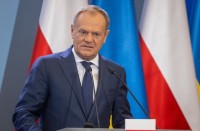
(Reuters) Denmark extended temporary controls at its border with Germany on Monday, imposed to help control an influx of migrants, as the European Commission confirmed it would shortly authorize more such extensions within the passport-free Schengen zone.
Seven members of the Schengen zone, including Germany and Denmark, have introduced temporary border controls after more than one million migrants entered the European Union last year, mostly via Greece.
The European Commission, struggling to prevent the collapse of the Schengen accord, is expected this month to allow EU member states to retain the emergency border checks, which are due to expire in May, for a while longer.
Denmark, which first introduced border checks on Jan. 4 in response to similar steps by its northern neighbor Sweden, said it had prolonged them by a further 30 days to June 2, citing concerns about illegal immigration.
In Brussels, Commission spokeswoman Mina Andreeva said: “By May 12 at the latest (the Commission) should have a decision ready which would allow (us) to prolong internal border controls under the Schengen Borders Code.”
“We have a decision on this ready for next Wednesday,” she told a daily news briefing.
Countries that first resorted to internal border checks blamed Greece – Europe’s main point of entry for the refugees and migrants fleeing wars and poverty in the Middle East and Africa – for not controlling its part of Schengen’s external border well enough.
The Commission launched a procedure against Greece on that basis, which allows it to approve a further extension of the temporary border checks other countries have introduced.
Brussels can authorize border checks inside Schengen to be in place for a maximum of two years in total. A European Commission source told Reuters it was leaning toward allowing their extension until November.
The move will be welcomed by Germany, which had asked Brussels for the extension.
Even though Greece has improved its record considerably since first being criticized by Brussels, there are still “some deficiencies” in its border management, Andreeva said.







